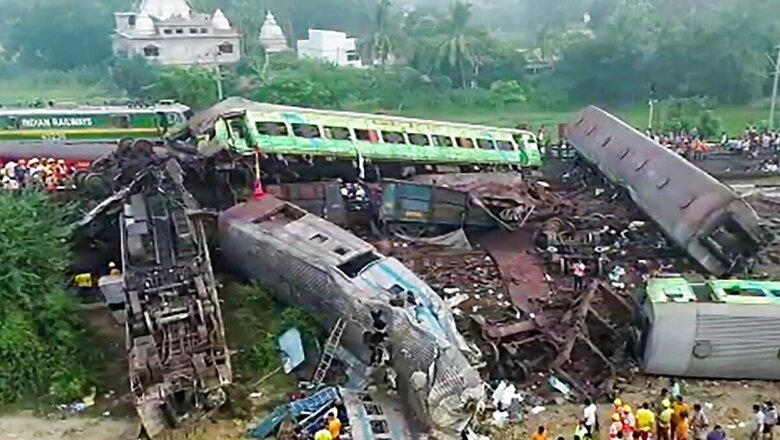Odisha Train Tragedy: Did Railway Staff Lose Track? Officials Hint at Human Error, Rule Out Sabotage

views
A huge push for punctuality and so many trains back to back in line on major routes not just put a lot of strain on the machines but humans too. And railway staff are no different. News18 spoke to a few officials who ruled out the possibility of “sabotage” in the Odisha incident, but said the error could have possibly made due to “overburdened” staff, and that it was an “unintentional mistake”.
Last week, News18 had reported that as of February, out of 96,582 sanctioned non-gazetted posts in the South Eastern Railway (SER), 17,811 are vacant. Further, out of 937 sanctioned gazetted posts, 150 are vacant.
Bahanaga Bazar railway station in Odisha, where the accident took place that killed over 270 people, is under the SER. Also, 14,815 posts are vacant across India in the Signal and Telecommunication department alone.
A senior official from SER explained to News18 that the staff, who are directly involved in train operations, are under a lot of pressure.
“On major busy routes, like the one where the accident took place, trains are so frequent that in around every two-three minutes, there will be a train. Sometimes, the pressure is so high that they may ignore some issues, not intentionally, but by accident,” the official said, demanding anonymity.
Also, stopping one train will impact punctuality of not just that one train but those behind it as well.
“It is possible that the point was not set properly or that the signals were not operating as they should or also that the train was derailed due to some other reason. It is possible that the maintenance request was raised but ignored, it is also possible that the maintenance was done in a hurry due to pressure and it is also a possibility that something else has happened,” the official added, saying only a detailed investigation can reveal the real reasons.
They also said questioning their own staff who work tirelessly to operate thousands of trains per day across India is only demoralising.
“Sometimes, the staff are under great pressure that they may make mistakes. We all make mistakes. It is indeed a criminal mistake but it is possible it was not intentional. I don’t agree with the word ‘sabotage’,” the official said, explaining that they are not saying that the staff are careless but “simply humans” and the mistake could have been “unintentional”.
“Manipulation of the system intentionally is something I cannot believe. Even if the control and monitoring units in a particular station and section are manipulated, it will be reflected in the central monitoring unit (for that division),” they said.
The official further said they can only talk about situations based on their knowledge and experience but stressed that there is no denial of the pressure on the staff working in train operations.
Echoing similar sentiments, another official from the Kharagpur division of the Railways, under the SER, said the electronic siganlling and interlocking is so sensitive that even if a stone is impacting the route, the signals will turn red.
“I am not saying that it does not involve human interference but sabotage is a very strong allegation. The system is very sensitive as well as smart. Just by digging some wires or changing points or simply pressing some buttons will not impact the system, although with these acts, the signal can fail. But in a failed system, the signals will turn red,” they explained.
They also said the only person who can really tell what happened was the loco pilot. Although he has given a statement, “but we cannot ignore his state of mind. He must be in a shock after the mishap”.
The Kharagpur official also said the staff have to work in longer shifts sometimes as they don’t get anyone to relieve them and all these things add to the unsafe circumstances.
“Running by the book is not always possible and the situation on the ground needs to be altered. Sometimes it is the best one can do and sometimes it is not. Some people perform well under pressure and some cannot. That happens in every field and job. The pressure of ensuring punctuality despite back to back trains is a major challenge,” they concluded.
A third official, who did not wish to be named, said while there are talks about signals, it is also possible that the train derailed before entering the loop line and it is because of its speed that the coaches were everywhere, including hitting the goods train.
“A number of reasons can be there for derailment. It can take place because of the track or even wheels. It can be the fault of the railway staff in properly examining the equipment or inadequate maintenance of
locomotives, rolling stock, track or signals,” he explained.
A detailed investigation of the track and wheel is also critical, the third official said. The first wheel of the derailed section needed to be identified and also the point of mount and point of drop.
“Investigation is on and we should wait for it. If we are talking about human interference, it is also possible that it is more of negligence and not a planned criminal act. Running trains is not just one person’s duty but a number of people are involved. Accidents due to human errors have taken place earlier also,” they said.
Meanwhile, just days after the accident, the CBI has started the investigation on Tuesday.




















Comments
0 comment